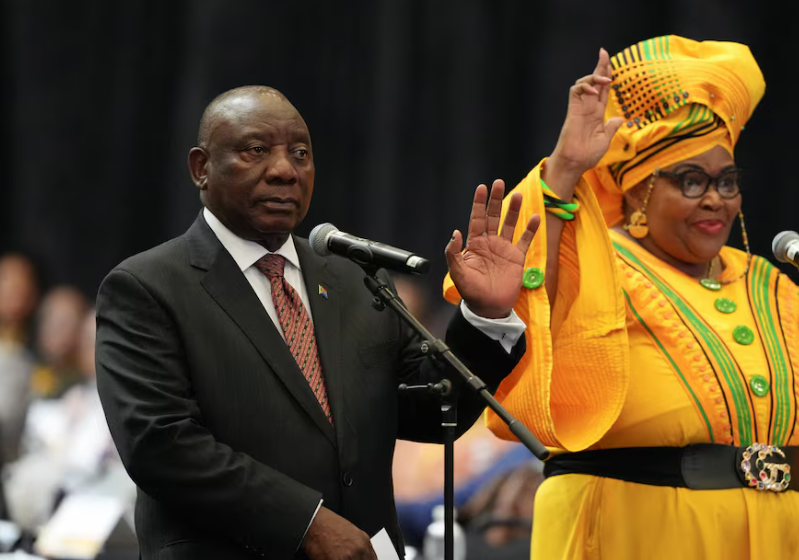The ANC and the DA Form a Landmark Coalition to Secure the Future of South Africa
South Africa’s political landscape has undergone a sea change with the historic agreement between the African National Congress (ANC) and the Democratic Alliance (DA) to establish a unity government. The African National Congress (ANC), which has ruled South African politics since apartheid’s end, lost the majority in the most recent election on May 29, prompting this historic partnership.
A Revolution in Teamwork
Friday saw the announcement of the agreement to collaborate, with leaders from both parties voicing their confidence about the future. John Steenhuisen, leader of the Democratic Alliance, hailed the deal as a watershed moment for South Africa in a nationally broadcast speech. “Compared to yesterday, South Africa is a much better country today. This is the first peaceful and democratic handover of power to a new administration that will be distinct from the last, according to Steenhuisen, and it has not happened since 1994. After decades of ANC control, he said, multi-party governance is the “new normal.”
A Road to Harmony
After the African National Congress (ANC) lost control of parliament, it had to negotiate with other parties for two weeks. On Friday morning, as the new parliament was convening, these conversations came to a close. With the words, “Today is a remarkable step in the aftermath of the 29th of May,” ANC Secretary-General Fikile Mbalula emphasized the significance of this alliance. The country benefits from the government of national unity.
Difficulties and Possibilities
Poverty, inequality, crime, and corruption are some of the reasons that have contributed to the ANC’s falling popularity. The public’s faith in the party has been steadily declining due to rolling power shortages that have affected the nation. For a country that is still coping with apartheid’s aftereffects, the DA’s ascension to the national government is perceived as a turning point.
A number of the ANC’s Black empowerment programs have been the target of criticism from the DA, who claim that the schemes have enriched a politically connected elite at the expense of the general public. The Democratic Alliance, on the other hand, promotes strong economic growth and responsible government as means to better the lot of all South Africans.
Various Responses
Many people feel conflicted about this political change. Not everyone is on board with the coalition, though; others see it as a vital step toward reviving South Africa’s political scene. “The ANC was also failing,” Bongani Msibi, a Soweto street seller, said, expressing cautious optimism. For their comeback, they require a companion. The majority of DA members are white, so if they banded together, we could gain more influence and perhaps see positive change—maybe even the creation of new jobs.
Alterations to Leadership and Laws
In a meeting held in Cape Town, the newly formed National Assembly chose Thoko Didiza, an ANC member, to serve as its speaker. Both the speaker and the chief executive officer will be selected by the assembly. As the current president and head of the African National Congress (ANC), Cyril Ramaphosa is anticipated to secure reelection with the backing of the coalition partners.
Part of the deal that formed the alliance is that the DA will become the National Assembly’s deputy speaker. Out of the 400 seats in the legislature, 159 were won by the ANC and 87 by the DA. Former president Jacob Zuma’s uMkhonto we Sizwe (MK) party and the extreme left-wing Economic Freedom Fighters (EFF) are two other important actors.
The Hopes and Fears of Investors
Investors are looking forward to either the continuation of policies or the quickening of reforms, thus they have a favorable impression of the coalition. With the right-wing Patriotic Alliance and the Inkatha Freedom Party (IFP) being part of the unity government, stability is further increased. The ethnic Zulu base and the coloured (mixed-race) community are two distinct constituencies that these smaller parties seek to serve.
Since the EFF and MK will no longer have a say in policymaking, the establishment of the coalition is likely to increase market confidence, according to Capital Economics, a research firm based in London. The installation of an official as KwaZulu-Natal’s premier by the IFP—with the backing of the DA, ANC, and an additional party—is indicative of the direct influence of the coalition on provincial politics.
In summary
Forming a unity government, the ANC and DA have marked a watershed event in South Africa’s political history. As the country begins a new era, the coalition must deal with long-standing injustices while also paving the way for a brighter, more equitable future for all. If the two sides can’t find common ground and work together to solve South Africa’s many problems, then this cooperation will fail.
















